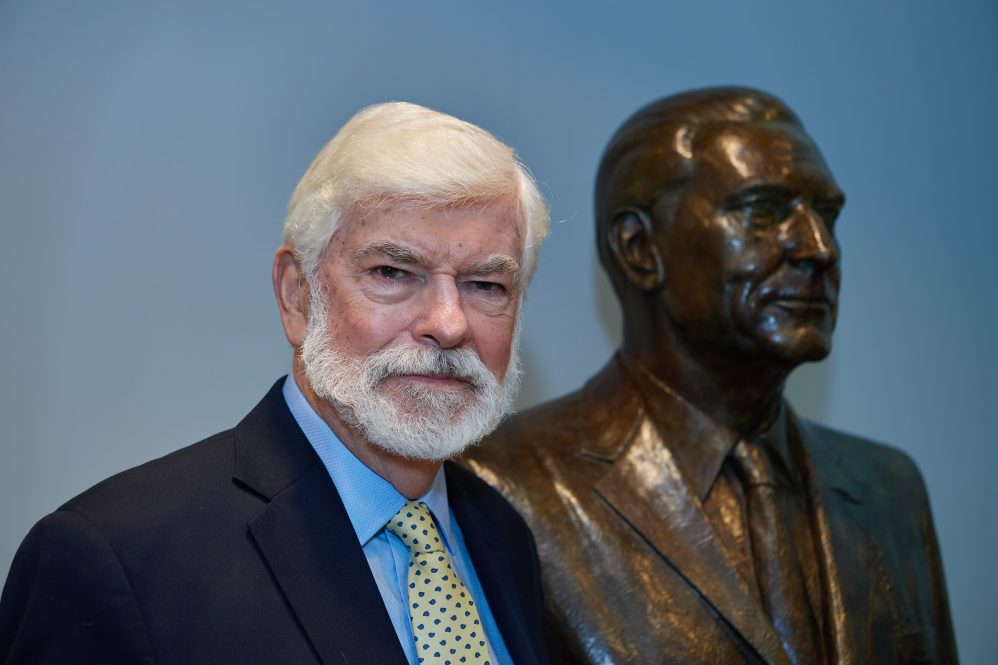It’s hard for Christopher Dodd to remember an evening when his father didn’t find an opportunity to talk about his experiences at Nuremberg.
“Growing up, with my five siblings, Nuremberg was very much a part of his life,” says Dodd. “He often said he never did anything as important in life as the 18 months he spent at Nuremberg.”
When Dodd was just one year old, his father left for Germany to serve as a prosecutor at the historic Nuremberg Trials – he’d been asked by Supreme Court Justice Robert H. Jackson, the chief prosecutor for the United States, to join the trial team as it sought to hold accountable some of the Third Reich’s most notorious actors.
Thomas Dodd quickly rose through the ranks of the prosecution team, distinguishing himself with the skill that he brought to his cross-examination of the Nazi defendants.
“He was so good at storytelling,” says Helena Foulkes, former chair of the Dodd Impact Advisory Board and Thomas Dodd’s granddaughter. “The power of using that paperweight that Hitler had on his desk that was actually a skull of a victim – I think for the members of the jury, that moment made it deeply personal. I think my grandfather was exceptional at that, and my uncle has been exceptional at that, and I think that’s one of the powers of human rights. It’s touching people on a deeply human level.”
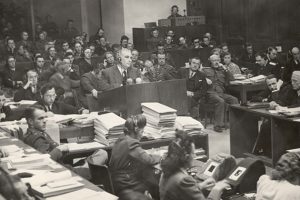
“He carried that work forward in the work he did as a member of Congress, as a lawyer,” says Christopher Dodd, who later followed in his father’s footsteps, serving as first a member of the U.S. House and then the U.S. Senate. “I found a way to be involved in the subject matter in different ways than my father did, but the common theme was human rights.”
Thomas Dodd’s papers from the Nuremberg Trials – including the numerous and detailed letters he wrote to his wife, Grace, while he was away, letters that are also memorialized in Christopher Dodd’s 2008 book, Letters from Nuremberg: My Father’s Narrative of a Quest for Justice – are now entrusted to the care of UConn’s Archives and Special Collections.
They’re housed in the former Thomas J. Dodd Research Center in Storrs, which was renamed this year by UConn’s Board of Trustees in recognition of the collective 52 years of service from both Senators Dodd as well as the human rights contributions of the entire Dodd family.
The building will be formally dedicated as the Dodd Center for Human Rights in a ceremony to be held on Friday, October 15, 2021. The event, “Human Rights for the Next Generation,” will be hallmarked by a visit and remarks from U.S. President Joe Biden as well as students, faculty, staff, and other dignitaries.
It will be only the second time in the University’s history that a sitting American president has visited – the first was President Bill Clinton on October 15, 1995, to mark the opening of the Dodd Center.
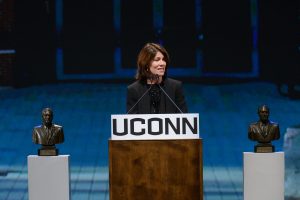
But, for both UConn and the Dodd family, the dedication is about much more than just a building.
“I think, for our whole family, there’s an incredible sense of pride that the Dodd Center represents now multi-generations working in human rights,” says Foulkes. “The dedication is very exciting for all of us in the family, and I think it’s because it’s not about a name. This is about putting UConn on a national and international platform.”
A Career of Service
For Christopher Dodd, the lessons of Nuremberg helped to guide a noteworthy career of public service punctuated by a legacy of human rights advocacy and action.
“Justice Jackson said, in his opening statement at Nuremberg, now more than 75 years ago, ‘That four great nations, flushed with victory and stung with injury, stay the hands of vengeance and voluntarily submit their captive enemies to the judgment of the law, is one of the most significant tributes that Power has ever paid to Reason,’” Dodd quotes. “That one sentence captures what Nuremberg was about. It’s about the rule of law.”
After graduating from Providence College in 1966, Christopher Dodd entered the Peace Corps, serving in the Dominican Republic. He was elected to the U.S. House in 1975 after earning his law degree from the University of Louisville, and was first elected to the U.S. Senate in 1980, where he would make his mark on human rights matters both foreign and domestic during his five consecutive terms representing the state of Connecticut.
“I had a strong interest in the geography of Latin America,” he says, “and the major issues of the day – the human rights issues – involved El Salvador, Nicaragua, Guatemala, Honduras. So, I spent a lot of time on those issues.”
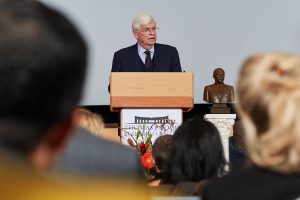
Since his time in the Peace Corps, Dodd maintained that the way to promote democracy in Latin America was through engagement and information. He was a vocal advocate of opening foreign dictatorships to ideas, trade, and political dialogue – in the 1990s, he called on Nicaragua’s Sandinista army and Contra rebels to turn in their weapons to help preserve peace in their own country and prevent their arsenals from fueling civil war in El Salvador.
Dodd was a lone voice calling for an end to isolationist policies toward Cuba in the early 2000s, long before the Obama Administration finally took action, and he served as a senior member of the Senate’s Committee on Foreign Relations, guiding policy with Western nations as a subcommittee chair.
Domestically, Dodd wrote the nation’s first childcare legislation – the Family and Medical Leave Act, which he spent nearly a decade working to enact. After its passage, he continued to advocate for the law’s expansion, and for the establishment of paid leave for new parents and for family caregivers.
He also founded the first Children’s Caucus in Congress, and drove legislation to fully fund Head Start, childcare, and preschool programs; reduce childhood hunger and help lift families out of poverty; provide services for premature infants and children with autism; and protect children from neglect and abuse.
“One out of four Americans are under the age of 18, and there was no caucus,” he explains. “They don’t vote. They don’t make campaign contributions. But they are the future, so I did whatever I could in that space as well. It was a combination of international affairs with human rights, as well as domestic issues involving children, principally, that gave me the greatest sense of pride.”
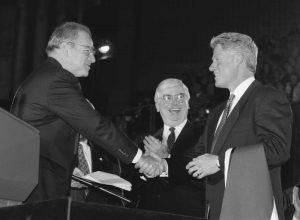
He was also a staunch supporter of ensuring access to healthcare through the federal Affordable Care Act and raising Medicaid eligibility levels and rates. As one of the namesakes of the landmark 2010 Dodd–Frank Wall Street Reform and Consumer Protection Act, he was a critical force in enacting reforms in the financial industry in response to 2008’s Great Recession.
“Our humanity, in many ways, is defined by how we treat the most vulnerable, and not just elsewhere, but in our own country,” Dodd says. “Human rights is not just a foreign policy issue. It’s a domestic issue as well, and too often I think we’ve thought about it as a foreign policy issue. If we recognize that it’s not just something that happens in China, or something that happens in Africa or in Latin America, but it happens in our own communities – if we all become sensitive to that, and try to figure out intelligent, thoughtful ways to address it, then we can make a significant contribution to the subject matter both domestically and internationally.”
“Like his father before him, Chris Dodd fought tirelessly to ratify a treaty establishing penalties for genocide,” says Connecticut Congresswoman Rosa DeLauro, who has known Dodd for more than 40 years, and first served as his campaign manager and chief of staff, and later as a colleague in Congress. “He spoke out against the wars in El Salvador and Nicaragua – calling the Administration’s policy ‘a formula for failure.’ And years later, he took on the Bush Administration by speaking out against the war in Iraq, when he said that the war had been waged ‘for all the wrong reasons’ and correctly pointed out that it was eroding our nation’s security and its moral leadership.”
DeLauro continues, “Senator Dodd was prescient when it came to issues pertaining to human rights and justice around the world. It is why the Dodd Center has such a broad reach, bringing together so many brilliant minds and changemakers in pursuit of universal human rights – empowering and inspiring the next generation to be the change we need in the world today.”
The Future of Human Rights
Since the initial dedication of the Dodd Center 25 years ago, human rights education, scholarship, and action at UConn has seen a rapid and dramatic expansion that is only expected to continue.
“The University of Connecticut has emerged as a world leader in the teaching, research, and outreach around human rights, and that’s happened over the last 25 years through philanthropy, through investment from the University, and through the hiring of a remarkable group of faculty,” says Daniel Weiner, UConn’s Vice President for Global Affairs and a professor of geography. “Human rights is now part of our DNA at UConn.”
“The dedication of the building is a wonderful opportunity for the campus and the wider community to come together and celebrate what we’ve accomplished over the past 25 years,” says Glenn Mitoma, director of UConn’s Dodd Human Rights Impact and an assistant professor in the Neag School of Education. “Going forward, this building will be a place where students, faculty, and the broader community can come together to address the most pressing human rights challenges we face. It will be a place of knowledge, of truth, but also of democracy, of shared values, and of building capacity to solve problems together, in a way that allows us all to enjoy the basic dignity we know we deserve.”
The Human Rights Institute is the hub of human rights programs at UConn, and it supports interdisciplinary education, research, and scholarship into the most pressing human rights questions. The outreach and engagement arm of human rights at UConn, Dodd Impact is a component of the Human Rights Institute, and it works to develop and support programs and initiatives that seek to directly impact local and global communities by helping them meet their human rights challenges.
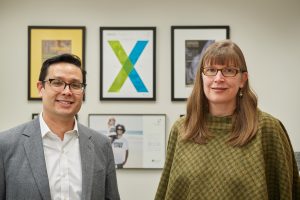
“We have the largest educational program in human rights at a public university in the United States,” says Kathryn Libal, director of the Human Rights Institute and an associate professor in the UConn School of Social Work, “and bringing together HRI and Dodd Impact means that we have one of the very best university-based human rights programs in the world.”
Libal continues, “We have more than 40 faculty who are pursuing topics ranging from sociology to social work, to education to engineering, and some are working collaboratively in teams to advance our understanding of human rights on the ground. We have longstanding, distinguished research programs in economic and social rights, in critical humanitarian studies, and in global health and human rights. We also have recently begun to think about human rights practice, both the research around how people do human rights work in their communities, as well as how we foster that in our students and in our engagement beyond the University.”
Nearly 200 undergraduates at UConn are now majoring in human rights, with additional students also participating in UConn’s master and graduate certificate programs.
Dodd Impact provides community engagement opportunities through its Democracy & Dialogues program – facilitating community deliberations and discussions and building local partnerships to increase local democratic and civic participation.
The Institute also supports human rights advocacy and awareness through the arts, and has launched a Human Rights Film & Digital Media Initiative in coordination with UConn’s Department of Digital Media & Design that recognizes and supports the use of visual media as a powerful agent of human rights action and change.
“We’ll be launching a post-baccalaureate certificate program for teachers on Holocaust and genocide studies in collaboration with our colleagues in Judaic Studies and in the Neag School of Education,” says Libal. “This year, we’re also launching our human rights research and data hub, which creates a space to catalyze new projects on human rights research and to help train students in the most advanced methodologies that they may use, either if they go on into academia, to become lawyers, or to move into other kinds of professions.”
It’s all work, says Dodd, that now permeates the culture of education at UConn so that even students who aren’t majoring in human rights are exposed to the issues in such a way that they will hopefully carry it with them through their life.
“If we end up having a generation who are graduates of this great university who didn’t dwell on this subject matter, but learned about it,” Dodd says, “and then go out and make a difference in the lives of even a handful of people, I think they’ll feel as though this University not only provided a great academic experience in the traditional disciplines of a university, but that they got something else – something that isn’t available in many places – and that is an appreciation of our obligation as human beings to try and improve the lives of those who need it.”
To learn more about the Human Rights Institute, Dodd Impact, and the world-class human rights education and advocacy opportunities at UConn, visit humanrights.uconn.edu.
